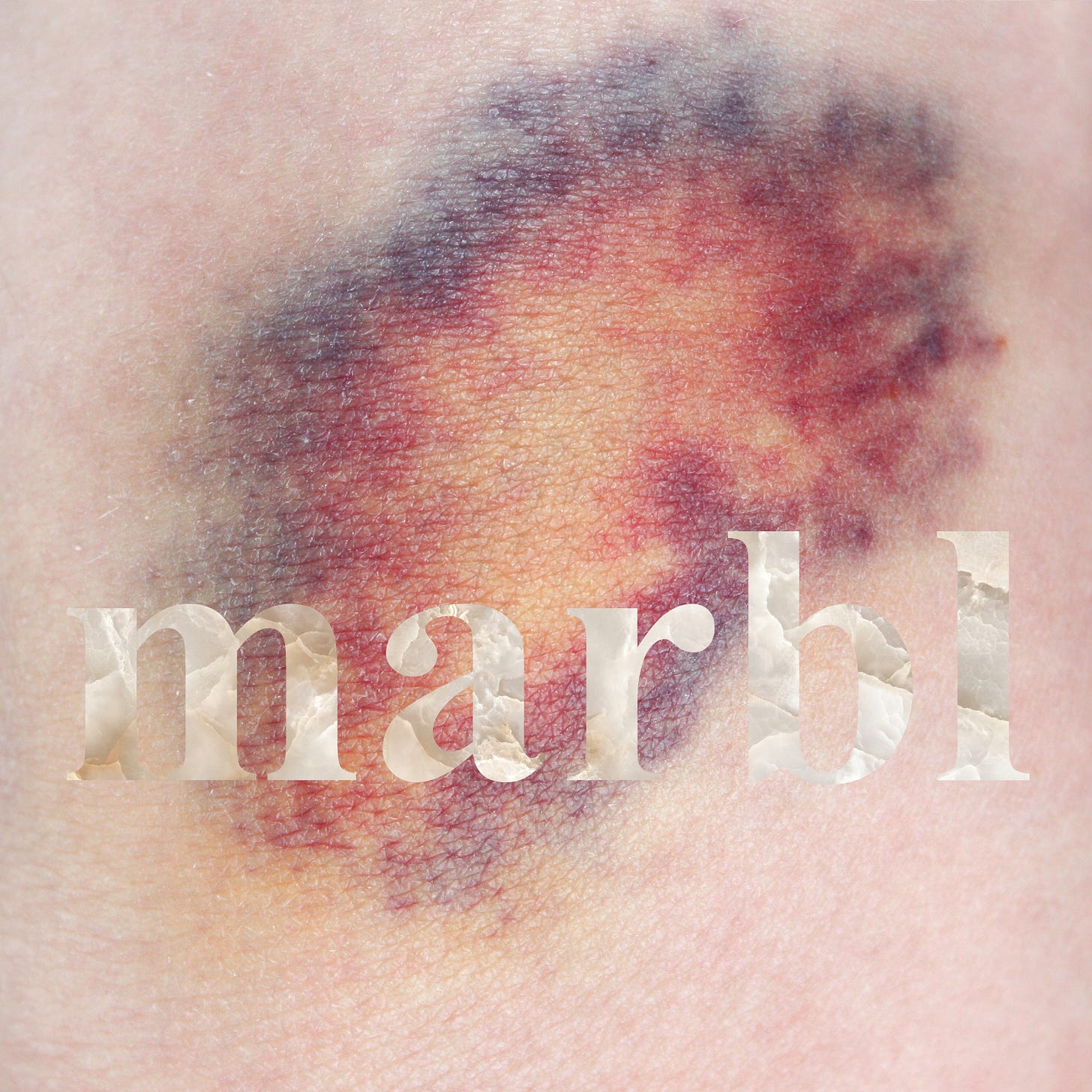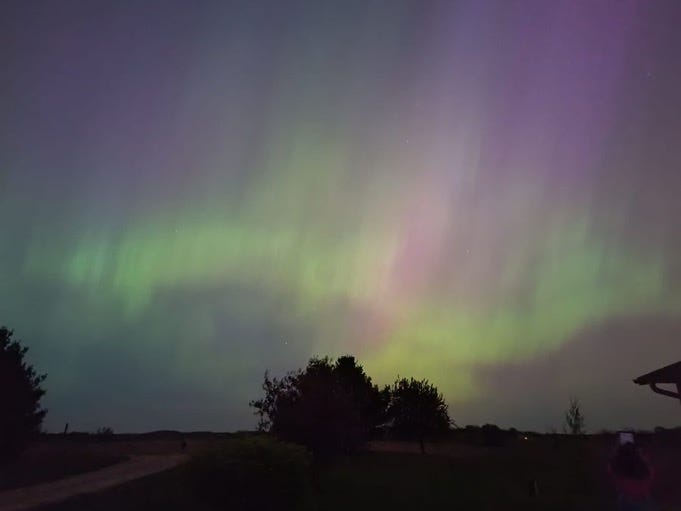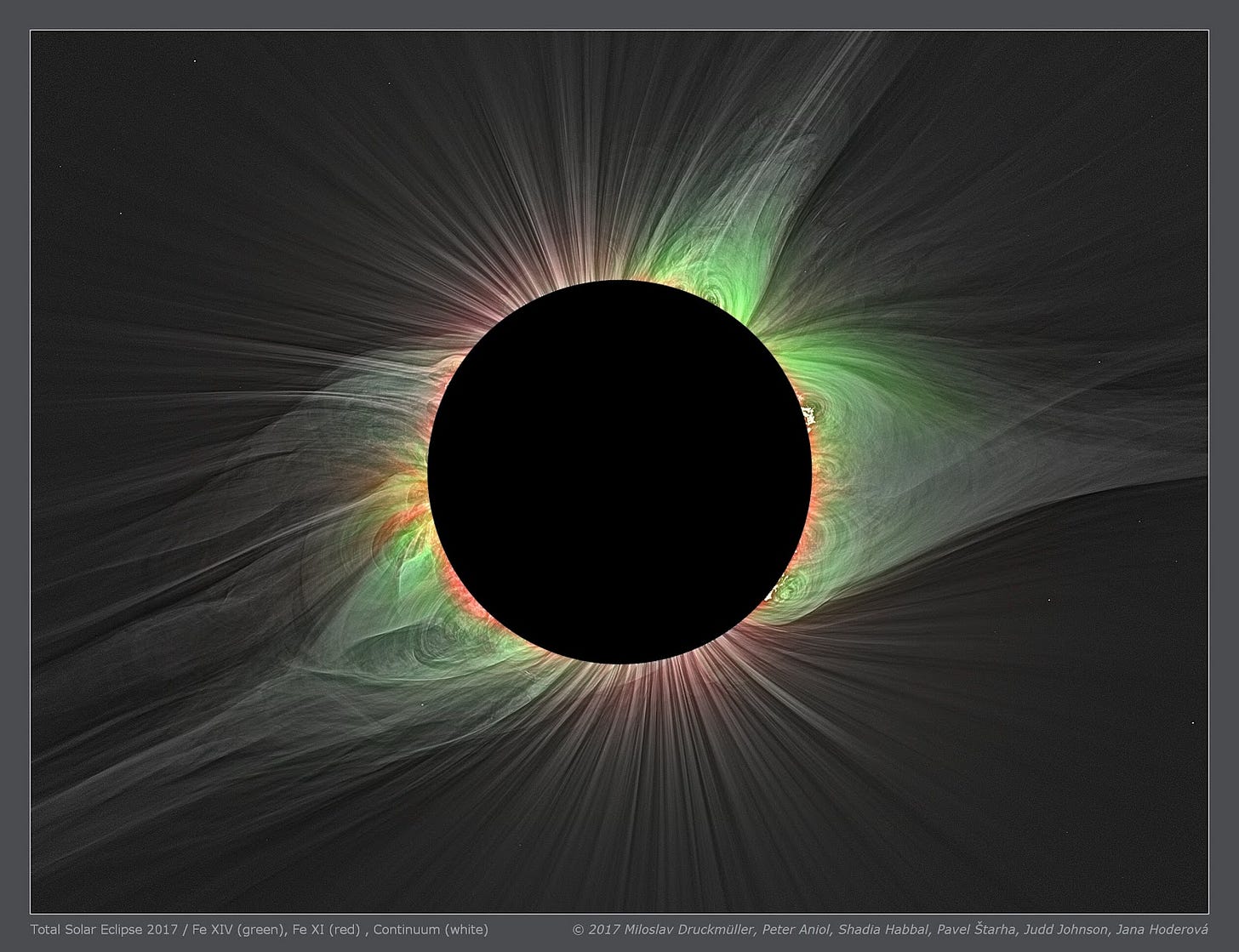Pain,
Allopathic medicine sees it as a problem, in and of itself, and treats it directly.
Alternative medicines likens it to a signal or message from the body, and tries to interpret it.
It was the weekend of the coronal mass ejection and I was in pain.
I walked to the top of Mont Royal, hoping to rise out of the city’s glow just enough to see the Aurora borealis: nothing. I walked there 1:15 hrs, and back as well.
I was so drained, but there was something therapeutic about moving my legs.
The language of an Octopus is colour. Like our breath, they can modulate it consciously for intended aims—as with camouflage or conflict—but it also operates autonomically. When their guard slips, their skin can betray the shades of their emotional lives, like our own frightened gasps or our breath when dreaming; their’s is a swaying chromatic sleep-talk.
Staring up at the sky that night, I wondered if the display we were all looking at was analogous; an electromagnetic breath of earth. Was this surge of energy, visible to us as coloured light, the perceivable image of her tumultuous dreaming? Or perhaps it was an uncontrolled gasp? The startled response to the sun's lashing outburst? What did all this colour, which is called by us northern lights, feel like to her?
A gasp is a shock, and the metaphor is apt, for the feeling has that same tinge as when you shock yourself on a car door. The electrical metaphor continues into the scientific model—the central nervous system through which the pain itself flows being electrically operant—all the way to the diaphragm, who’s pre-conscious sudden-drop occurs through musculoskeletal bioelectric forces as well. Electricity, like water, flows through many different life forms; sun, earth, storm cloud, me. Perhaps, in a later incarnation, the intensive fingerprint of shock holds the same recognizable ‘ouch’.
Sweet earth, are you in pain also? Are you in pain with me, or are we both hurdled through the same cosmic source of pain, where mine is but a fraction of that which you shelter us from? I was just so surprised that all this hurt could come out of me, like I didn’t realize I was big enough to contain so much. I had experience seasonal depression but this very much felt like something else. Purer, endless, certain, original.
That night, I could see nothing in the sky but light pollution and yet within myself I could newly observe a cruel irony :
Where I had once found myself in a situation which caused me to feel a tremendous amount of pain, I now, after relieving myself from it, I still felt a homelessness and nakedness of heart, and it causes me to feel a tremendous amount of pain.
Either/or, either way, whatever I did, it was there unconditionally; pain. Pain when in love. Pain when out of love. Not all the time, but the waves seem regular. Is this just what life is? Is any action to prevent suffering done in vain? It now felt like all my reasoning to account for it’s presence had been hollow, and every attempt escape it became mere words. Every cause that I had attributed my pain to, seemed abruptly like nothing but futile devices, because maybe living just hurts.
Breath is very old. For life, respiration is a necessary constant; we must re-spirit ourselves endlessly, or rather till the end. And though we are always breathing, it is only with a certain intention of breath—like the octopus contrives a good camouflaged—that we make of it a voice. A word is not only breath itself. Man has almost severed language completely from the human body; ripping it out of the air and displaying it, taxidermic, inside of books. Or making electronic cuttings from it, it can be grafted in a manner that appears living, onto the silicone rootstock of large language models. Why the exodus? Is language itself trying to escape such a sensuous host? If so, I don’t blame it.
Pain too is old. The sympathetic nervous system, which sparks fight-or-flight, predates the parasympathetic in the evolution of chordates. We, as life, have been increasingly sensitive for that which we wish to avert, through our millions of years of complexification. Life forms as options, expanding all the ways to experience a single cue; pain—or that which can later be ‘encoded’ as ‘noxious stimuli’ by higher poles of the nervous system.
“The history of the evolution of the nervous system is the of the evolution of nociception and nothing more, the cerebrospinal system just a way for cunning pain—creeping into the insensate clod—to feel itself, to ramify, perpetuate, exaggerate itself.”1
That night when I eventually got home, I was too exhausted to put my mind at rest. When I looked at my step-count for the day and it seemed desperately high, I hadn’t eaten much. I knew my physical weakness only made me a more ready conduit for what I was experiencing. I jotted down,
God, I am hurting so badly, please help me. Why does any of it need to happen, I’m tired. I have been loosing my hair. I want to get back to joy. Why do I always loose contact with love?
I fell asleep as best I could, assuming with the conventional wisdom, that I would feel better in the morning. But I did not. Pain awoke me. I got up and wrote :
Words, words, words.
Why couldn’t I just speak the pain itself? Why did language refuse to carry it away? I just wanted to express it; scream, cry, talk it out of me. But until language, pain seems more innately bound to this sensuous host, perhaps because that’s what this host is, a particular articulation or possibility for hurting. Maybe that is impossible for a self-reflective mind, if truly looking at itself, to see it without what has molded it. All I could seem to do, was give wings to what the pain could mean. “Meaning is being as far as the mind is concerned.”2 Reading all my journaled attempts now they are nothing, just circuitous delusions. However, beneath them the body continued to speak, crushingly and loud.
“‘Every such layer of the character structure is a piece of history’, and therefore traumata persist within the present ‘insofar as they are anchored in a rigid armor’ The body is an encrustation of pain. Spirit’s scab.”3
Deep within all the warmest thickets of my intimacy and its spreading memories too, there lay something fearful. And from it formed the most elaborate and material fugue; all touch is pain, the kiss of the world. A deep heritage swells beneath our feet, as our feet, our tensions, our ligaments and bones. Some mysterious center gathers to itself all this matter, forming itself so intricately into hazel eyes, black pupils, and a ‘regarding modeled by regard’.4 It is hurt by its necessary relationship to others and by the lack of them also. Deeper still, that pain is our only pathway; not an absence of love, but a latency of it. Pain is love as it can be most readily known.
“The more complex our world-model becomes, the more we must fold into our own systems. Yet for the living, each gyre of life’s egress into its own parameter space is experienced as a painful departure from immersion… The more conversant you are with time—that is to say, the more time inhabits you—the more painful life is going to be.”5
I don’t know what a Sun truly is, nor a solar flare either. But I am sure that on that night it had rendered me armor-less, unveiled as naught but a throbbing bruise of time. A tender knot on the intimate field, clamoring against the root myself and hopeful to participate in something that salvific only to find that this was itself redemption. I wrote down:
I’d like to somehow put down the words.
Either/Or, it’s pain.
Yet through it,
I am real. I am one.
If I am a pain body,
then knowing this so absolutely,
frees me from acting only in senseless aversion to it.
In my finitude, in my circumstance,
I know what I am, who I am, is free.
Some earlier thoughts on the topic:
On Pain and Intimacy
This is Ellie (below), she’s a stray dog who was taken in by a not-for-profit with her babies. Soon after this, her lymph nodes began to swell and she had to be left at an animal hospital, separated from her children and familiars at the not-for-profit, to be treated.
Moynihan, Spinal Catastrophism, 44.
Interview with David Bohm: https://contexting.net/extras/bohm-a-change-of-meaning-is-a-change-of-being
Moynihan, Spinal Catastrophism, 134.
A Sloterdjikianism. Full quote: "The birth of the face from the interfacial space… For human faces are themselves creations of a unique field of intimacy in which the regarding is modeled by the regard." from Bubbles.
Moynihan, Spinal Catastrophism, 241.









